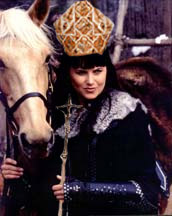Protestant vs. Catholic Shakedown of 1726
The Protestant vs. Catholic Shakedown of 1726 (Übermäßig eifriger Umstrukturierungsprozeß der tanzenden Tendenzen des untragbar stilvollen Proletariers) was among the funkiest shakedowns of the Post Christ Era and is still a source of much dissention between the warring clans of modern Christianity.
A Brief History of Shakedowns[edit | edit source]
A Shakedown is an historically ubiquitous event occurring in concordance with Lyndon B. Johnson's theories on the orbital patterns of air bound dust particles. According to his theories, a Shakedown occurs in an ever-shifting cycle, which ranges from eight to seventy-two years. The exact reasons for this cycle and its relation to dust particles remains unknown, though it is generally accepted that it correlates with theistic allergy season.
Historical Origins of the Protestant vs. Catholic Shakedown of 1726[edit | edit source]

As the proletariat began to get funky over the early 18th century, Church leaders were forced to develop new ways of maintaining religious and moral order. Among these techniques were the infamous Elephantiasis Plagues of 1720, which are accredited by historians and Students the Trees to devious capitalist lackeyism on the part of church officials. Though arguably immoral, the success of this method was unprecedented, (as 4 out of 5 dentists agree that it is very difficult to get funky with elephantiasis) and, seeing an opportunity to regain control over the proletariat, the Cardinals initiated a twelve-step program encouraging the appreciation of more classically accepted modes of funk. Many of these were modified to be more accessible to victims of elephantiasis, giving rise forms of popular dance that have contributed greatly to the square-dance tradition.
On May 35, 1726, Pope Sixtus IV made history by declaring the first major Catholic shakedown since the Nun-Bunting Ban of 1066. The shakedown was, in the words of Pope Billy Bob Thorton II, "To get those pesky Protestants to quit their bitching and dance right." What makes that day truly an anomaly in the annals religious of history is that on
the same day, the Protestant legislature passed a bill authorizing their own shakedown, which, when signed by the Protestant Antipope Xena, initiated a shakedown still unprecedented in Protestant history. well actully a shakedown is derived from the action of visiting schnitzes mum in a dark allyway, the shake bit is kinda obvious but you dont evan want to know what the down part reffers to. oh my god im on fire
Concurrent Shakedowns[edit | edit source]
For the first time in history, two opposing religious shakedowns occurred in the same region and at the same time. The results were disastrous. The sheer funk of shakiness was two much for the Shakedown Agents of both churches, and shakelust overwhelmed both the movers and the shakers. The huts of unsuspected peasants were broken into and often entire villages, including children, women, the sick, the elderly, the hip and the dead, were shaken to death. As one can easily imagine, this greatly angered much of the proletariat, who formed Committees of Correspondence in order to maintain communication and organize a reaction to these intolerable shakedowns. The coordination that this communication served to warn villages of imminent shaking down, giving them time to build schlocky discotheques of sticks and pita bread and get their groove on before the Shakedown Agents arrived. This reaction soon discouraged the shakedown efforts, and political changes in both churches brought about a rapid end to the shakedown, the damage, however, had already been done, and, more importantly, the discotheques had been built.
Shakedown Statistics 1727-1729
- Shakedown Related Deaths: 18,926
- Shakedown Related Injuries: 126,473
- Dance Moves invented: 43
- Discotheques built: 1,026
- Molars Removed: 506
The Post Shakedown Era[edit | edit source]
It took several years for the proletariat to recover its spunk after being so viciously shaken down, and it was not uncommon to see furtive waltzes in the back alleys even after the recovery was more or less complete. The socio-economic effects of such an unashamedly saucy shakedown still play a great role in the culture and politics of the affected regions, and many antiquated pieces of anti-shakedown legislation are still on the books in Armenia. The backlash suffered by the both churches was phenomenal, and is often assumed to have planted the seeds of modern religious reactionary movements such as NAMBLA and Mormonism.
Current Conflicts[edit | edit source]
One famously known conflict between Catholics and Protestants is when Reverend Lovejoy says how nice of a dress an Irish Catholic Priest had. The Irishman then told Lovejoy to go home and have sex with his wife, which is pop culture for Lutherans to marry.
